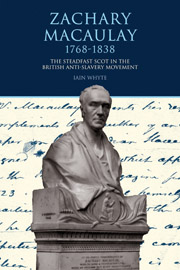Book contents
- Frontmatter
- Contents
- Foreword
- Acknowledgements
- Abbreviations
- List of Illustrations
- Chronology
- Introduction
- 1 From Inverary to the Sierra Leone River
- 2 Slave Traders and French Invaders
- 3 Captive in Love—to Selina Mills
- 4 The Trials of the Governor
- 5 Caught in a Multitude of Tasks
- 6 Clapham, Family and Friends
- 7 Attempting to Win France for Abolition
- 8 ‘Let Us Look it Up in Macaulay’—The Anti-Slavery Arms Manufacturer
- 9 Commerce and Conflict
- 10 Triumph and Tragedy on the Path to Glory
- 11 As Others Saw Him—As We Might Assess Him
- Bibliography
- Index
3 - Captive in Love—to Selina Mills
- Frontmatter
- Contents
- Foreword
- Acknowledgements
- Abbreviations
- List of Illustrations
- Chronology
- Introduction
- 1 From Inverary to the Sierra Leone River
- 2 Slave Traders and French Invaders
- 3 Captive in Love—to Selina Mills
- 4 The Trials of the Governor
- 5 Caught in a Multitude of Tasks
- 6 Clapham, Family and Friends
- 7 Attempting to Win France for Abolition
- 8 ‘Let Us Look it Up in Macaulay’—The Anti-Slavery Arms Manufacturer
- 9 Commerce and Conflict
- 10 Triumph and Tragedy on the Path to Glory
- 11 As Others Saw Him—As We Might Assess Him
- Bibliography
- Index
Summary
Stormy Beginnings
‘Accept my dear Selina, my heartfelt acknowledgement of all your undeviating care and kindness, and forbearance and devotion, and rest assured of the undiminished warmth of my attachment, and of my increasing regard and affection’. These words were written by Zachary Macaulay on their seventeenth wedding anniversary, in what was to be just over the halfway mark in their marriage. By the standards of the time, although on the surface it seemed to be a very traditional one, with gender roles carefully demarcated, this was by no means the whole story. It was from the start marked by an extraordinary mutuality. Neither Zachary Macaulay nor Selina Mills would have recognised the concept of gender equality; yet there were strong elements of an equal partnership in the years that they shared together.
However, the beginnings of the courtship were as rocky and bizarre as romantic relationships in a Jane Austen novel. Although the Clapham Sect and their associates were overwhelmingly male, there were two women who could make some claim on membership of its club. One was Margaret Middleton, wife of Sir Charles Middleton, later Lord Barham, Tory MP from 1778 to 1790 and Comptroller of the Navy. The Middletons held many an abolitionist meeting at Barham Court in Kent, in which Margaret made her presence felt. Despite William Wilberforce's strong aversion to having women active in the campaign, Margaret Middleton is thought by many to have been the one to persuade Wilberforce to raise the issue of the slave trade in Parliament.
- Type
- Chapter
- Information
- Zachary Macaulay 1768-1838The Steadfast Scot in the British Anti-Slavery Movement, pp. 53 - 71Publisher: Liverpool University PressPrint publication year: 2011



